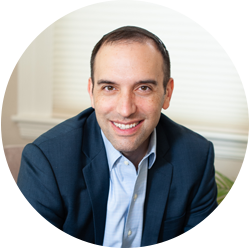Dear Friends,
As we head into Independence Day weekend, I find myself reflecting on freedom.
“We hold these truths to be self-evident, that all men are created equal, that they are endowed by their Creator with certain unalienable Rights, that among these are Life, Liberty and the pursuit of Happiness... .”
Our founders declared that freedom was not only a core principle of this country, but also a spiritual truth and a human right. From a political perspective, giving freedom and power to the people to self-govern flips the script of the hierarchy of power that defines most other forms of government. From moral and spiritual perspectives, self-determination is essential to the dignity and agency of every human being. To put it in the language of the Jewish spiritual tradition, each of us needs to be liberated from whatever version of “Egypt” by which we are “enslaved.”
Several years ago, CJP sent a mission to Israel called, “The Miracle and the Messiness,” which celebrated that the very existence of Israel — the creation of an independent Jewish state and the restoration of Jewish national dignity and self-determination after 2,000 years of diaspora — was itself astounding and miraculous. It also acknowledged what George Washington says to Alexander Hamilton in the musical Hamilton: “Winning is easy, governing is harder.” Or, as Winston Churchill put it, “It has been said that democracy is the worst form of government except all the others that have been tried.”
The title of that mission could describe the American Revolution as well. A group of people asserting their freedom to create a society that lives out the noblest of human aspirations and ideals is both miraculous and messy, both extraordinary and profoundly imperfect. I love this country not despite its flaws but because of them. I see in it the unfinishedness of the original human project — to partner with God and with one another in the creation and reparation of society and the world.
Which brings me to a second thought. The sacred obligation, the mitzvah (commandment) to create and repair, begins, of course, with freedom. One who has no agency over one’s own actions cannot ultimately be held accountable for them. Eleanor Roosevelt put it simply and clearly when she said, “With freedom comes responsibility.” We often focus on individual rights more than we do on the responsibilities that come with those rights. But we need to ask ourselves whether freedom is an end in itself — or a precondition to something more. Freedom for what? That is one of the questions that most powerfully determines the character of a society.
In the book of Exodus, God tells Moses to tell Pharaoh to “Let my people go in order to serve Me [God].” Given the miracle of liberation, it can be easy to forget that second part. Yet, regardless of what you believe about God, the key phrase is “in order to... .” Freedom for what? The first stop after leaving Egypt was Mount Sinai, where a group of newly freed individuals turned into a covenantal community, bound together not only by freedom, but also by shared responsibility to build a sacred society and a better, more compassionate, and more just world.
My wife recently shared with me the wisdom (which she heard from one of her teachers) that the opposite of gratitude is criticism. It is so easy to deconstruct and criticize the flaws of this country. Imagine a government and a society by the people and for the people when, by definition, every person is so imperfect! When not combined with a sense of agency, responsibility, and gratitude, criticism can be disdainful and destructive. At its best, when grounded in gratitude, a loving and constructive criticism is an expression of freedom of thought and a precursor to taking responsibility for making things — including one another and ourselves — better.
As we prepare for Independence Day, may we cultivate gratitude for our freedoms and the responsibilities that come with them.
Shabbat Shalom and Happy July 4th!
Rabbi Marc Baker

About the Author
CJP President and CEO Rabbi Marc Baker is an educator, writer, and leadership mentor who is devoting his life to Jewish learning and building Jewish communities.
